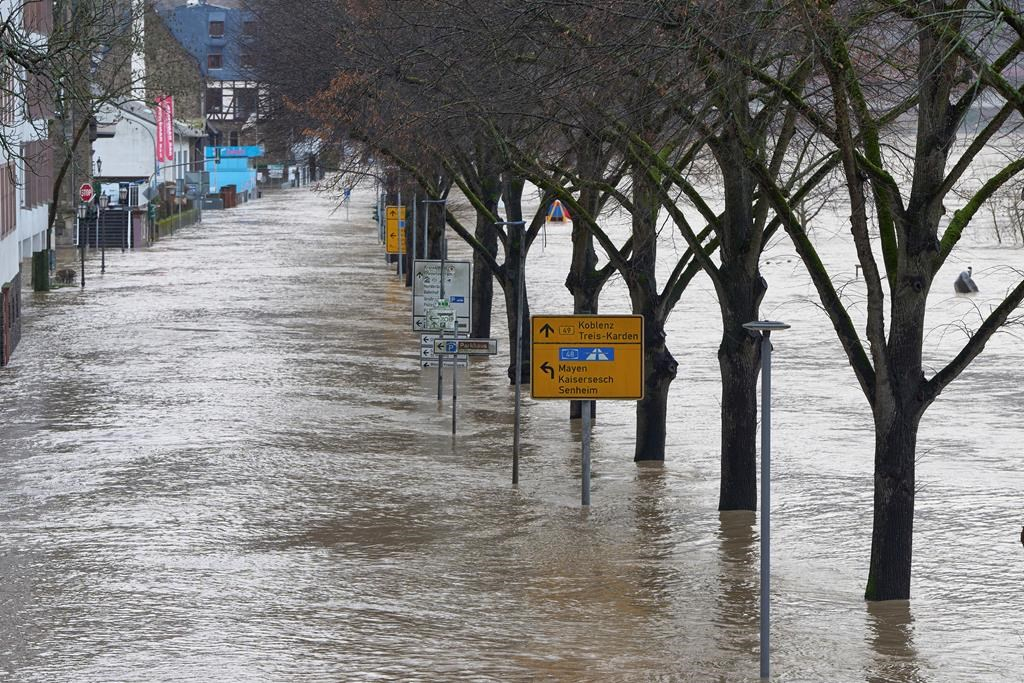Support strong Canadian climate journalism for 2025
Extremely cold temperatures compounded by gale-force winds and snow wreaked havoc across the Nordic region Thursday, leaving thousands without power while others braved the cold for hours stuck in their cars along clogged highways.
Heavy rains in Germany, France and the Netherlands again caused floods in regions that have seen persistent flooding in the last two weeks. One death was reported in France.
The deep freeze disrupted transportation throughout the Nordic region amid reports of traffic chaos following closures of sections of highways and major roads. Problems with rail service have also been reported.
Electricity was cut to some 4,000 homes in Arctic Sweden where temperatures plummeted to minus 38 degrees Celsius (minus 36.4 degrees Fahrenheit), according to Swedish public radio. In the southern part of the country, motorists were stuck in their cars or evacuated to a nearby sporting complex where they spent the night.
In neighboring Denmark, police urged motorists to avoid unnecessary trips as wind and snow battered the northern and western parts of the country.
In Finnish Lapland, the municipality of Enontekio, near the border with Norway and Sweden, recorded the country's lowest temperature this winter on Thursday at minus 42.5 degrees C (minus 44.5 degrees F). Meteorologists are forecasting even colder temperatures the rest of the week.
A ferry sailing between the capitals of Norway and Denmark finally docked in Copenhagen on Thursday after some 900 passengers spent the night aboard the vessel, which had been idling in the Oresund straight between Denmark and southern Sweden. On Wednesday, weather hampered the Crown Seaways vessel from sailing into the Copenhagen harbor.
In Germany, heavy rain has resumed in regions that have seen persistent flooding over the past two weeks. Chancellor Olaf Scholz on Thursday plans to make his second visit this week to inspect a dike and a sandbag-filling facility in the eastern town of Sangerhausen.
After several days of rain and rising waters, several towns in northern France were left under water Thursday. Hundreds of people have been evacuated in recent days. The area was also hit by flooding in November and December, and some towns still hadn’t recovered. Government ministers are traveling to the area on Thursday.
A 73-year-old man was found dead in his partially submerged car near the city of Nantes, France's national gendarme service said. He was reported missing Tuesday after he left his home to buy bread and didn’t return, and was found Wednesday as waters began receding in the area.
Earlier this week, a driver died after a tree fell on his car in western England, and in the Netherlands police in Eindhoven said strong winds may have played a role in the death of a 75-year-old man who fell off his bicycle late Tuesday.
The government in low-lying Netherlands, which also faced extremely high water levels in rivers and lakes, said it would send pumps to France to help it tackle widespread flooding.
“It has rained a lot recently, which means that the water in France can no longer be drained properly. In many places rivers have already burst their banks. That is why it is important to help each other get rid of the water as quickly as possible,” Infrastructure and Water Minister Mark Harbers said in a statement.
The Dutch emergency pumps can each process 5 million liters (1.3 million gallons) of water per hour.
Associated Press writers Angela Charlton in Paris, Geir Moulson in Berlin, Mike Corder in Amsterdam and Jari Tanner in Helsinki contributed to this report.




Comments